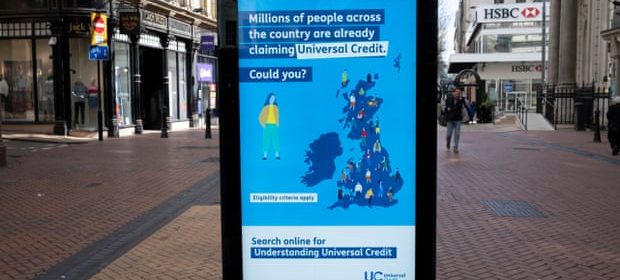Extend Covid measures or households face ‘cliff edges’, says Labour

Many low- and middle-income households will face financial hardship unless ministers maintain support for those who have lost their jobs or experienced steep cuts in income during the second wave of Covid-19, Labour has said.
The shadow chancellor, Anneliese Dodds, said in a new year message to Rishi Sunak that the chancellor must extend a range of Covid-19 rescue measures due to run out over the next three months “to protect struggling households from financial ruin”.
A mortgage holiday scheme and a ban on home repossessions should be extended beyond the 31 January cutoff date, said Dodds, while a £20-a-week boost to universal credit, due to run out on 6 April, should remain in place until the crisis is over.
Analysis by the Bank of England in November found that 28% of households experienced a drop in income during the first wave of the pandemic, rising to 66% among self-employed people.
Dodds said: “Whether employed, self-employed, relying on social security or a combination of all three, Britain’s beleaguered households face several cliff edges in the first few months of 2021.”
The looming deadlines include:
• 11 January: end of the ban on evictions.
• 29 January: deadline for applications for the third grant under the self-employed income support scheme.
• 31 January: deadline for mortgage holidays, end of ban on home repossessions.
• 31 March: applications close for government-backed loan schemes.
• 6 April: government due to cut £20-a-week boost to universal credit.
• 30 April: end of the job furlough scheme.
The price comparison website Energy Helpline said the number of UK consumers in debt to their electricity provider reached a five-year high during the pandemic and was on course to get worse.
Citing figures obtained under a freedom of information request to the regulator, Ofgem, the website said about 777,000 households had been in debt between July and September, a number not seen since the same period in 2015.
The first three quarters of the calendar year showed a rise in the number of consumers in debt to their supplier compared with the same quarter of 2019, with a 12% increase for January-March, a 5% rise in April-June and a 7% jump for July-September.
It called on Ofgem and suppliers to “do all they can to support the most vulnerable consumers struggling to pay their energy bills as a result of the pandemic”.
“Today’s figures could be the beginning of a surge in energy debt right across the country. Not only are consumers facing higher bills as a result of having to use more energy at home, but the pandemic is also leading to the real prospect of more expensive energy into 2021,” Energy Helpline’s director of energy, Tom Lyon, said in a statement.
Labour said British households were among the worst-prepared for a financial crisis after analysis showed they entered the pandemic with one of the lowest levels of savings in the developed world.
UK households saved £3,055 less than the average across other economies in the G7 group of nations in 2019, and a quarter had less than £100 in savings when the first lockdown was imposed last March.
Dodds said: “The irresponsible decisions taken by the Conservatives over the last decade left many UK households without a penny in the bank going into this crisis. When Covid hit, they had nothing to fall back on – and now some are teetering on the brink of financial ruin as several Covid support cliff edges loom.
“The chancellor’s chaotic, last-minute approach to this crisis plunged the UK into the worst downturn of any major economy, but it seems he hasn’t learned any lessons.
“Families up and down the country will continue to suffer if he doesn’t fix Britain’s broken safety net and tackle the root causes of income insecurity across our country.”
Source: Read Full Article
